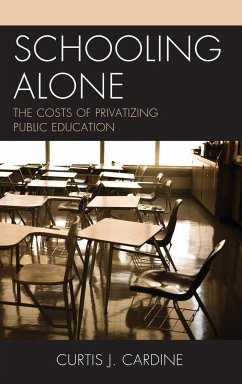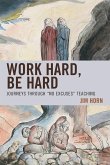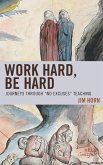- Gebundenes Buch
- Merkliste
- Auf die Merkliste
- Bewerten Bewerten
- Teilen
- Produkt teilen
- Produkterinnerung
- Produkterinnerung
Schooling Alone is a look at the history of public education and the current state of the efforts to privatize our public schools.
Andere Kunden interessierten sich auch für
![Carpetbagging America's Public Schools Carpetbagging America's Public Schools]() Curtis J. CardineCarpetbagging America's Public Schools53,99 €
Curtis J. CardineCarpetbagging America's Public Schools53,99 €![Work Hard, Be Hard Work Hard, Be Hard]() Jim HornWork Hard, Be Hard52,99 €
Jim HornWork Hard, Be Hard52,99 €![The Urban Challenge in Education The Urban Challenge in Education]() Joseph ScolloThe Urban Challenge in Education41,99 €
Joseph ScolloThe Urban Challenge in Education41,99 €![Unraveling Reform Rhetoric Unraveling Reform Rhetoric]() Jeff SwenssonUnraveling Reform Rhetoric36,99 €
Jeff SwenssonUnraveling Reform Rhetoric36,99 €![The Urban Challenge in Education The Urban Challenge in Education]() Joseph ScolloThe Urban Challenge in Education77,99 €
Joseph ScolloThe Urban Challenge in Education77,99 €![Work Hard, Be Hard Work Hard, Be Hard]() Jim HornWork Hard, Be Hard96,99 €
Jim HornWork Hard, Be Hard96,99 €![The Charter School Teacher's Guide to Understanding Homeschool and Parent-led Learning The Charter School Teacher's Guide to Understanding Homeschool and Parent-led Learning]() Nina ElenaThe Charter School Teacher's Guide to Understanding Homeschool and Parent-led Learning15,99 €
Nina ElenaThe Charter School Teacher's Guide to Understanding Homeschool and Parent-led Learning15,99 €-
-
-
Schooling Alone is a look at the history of public education and the current state of the efforts to privatize our public schools.
Produktdetails
- Produktdetails
- Verlag: Rowman & Littlefield Publishers
- Seitenzahl: 212
- Erscheinungstermin: 8. Oktober 2019
- Englisch
- Abmessung: 235mm x 157mm x 16mm
- Gewicht: 465g
- ISBN-13: 9781475850017
- ISBN-10: 1475850018
- Artikelnr.: 56748027
- Herstellerkennzeichnung
- Libri GmbH
- Europaallee 1
- 36244 Bad Hersfeld
- gpsr@libri.de
- Verlag: Rowman & Littlefield Publishers
- Seitenzahl: 212
- Erscheinungstermin: 8. Oktober 2019
- Englisch
- Abmessung: 235mm x 157mm x 16mm
- Gewicht: 465g
- ISBN-13: 9781475850017
- ISBN-10: 1475850018
- Artikelnr.: 56748027
- Herstellerkennzeichnung
- Libri GmbH
- Europaallee 1
- 36244 Bad Hersfeld
- gpsr@libri.de
Curtis J. Cardine has served as a teacher, principal, corporate officer, and superintendent in New Hampshire public schools and Arizona charter schools. He is currently a research fellow for the Grand Canyon Institute, author and a nationally recognized expert on charter and public school finances and governance.
Preface Chapter 1: Chartering Schools Chapter 2: An Entitlement Mentality
Students as Business Assets Chapter 3: Something Happened Selling the
Charter School Concept Chapter 4: De-professionalizing American Public
Education Repealing Labor Laws Take Care of Business Chapter 5: What about
the Sermon on the Mount? Chapter 6: The Good Old Days Chapter 7: Public or
Private Chapter 8: A Contracted Service Chapter 9: "All Politics is Local"
Chapter 10: Deregulating a Public Good Chapter 11: The Myth of
Self-Correcting Free Markets Chapter 12: Financial "Tells" Comparing Market
Sectors' Debt Chapter 13: Espoused Theories vs Theories in Use Consumer
Choice without Consumer Responsibility for that Choice Chapter 14:
Retirement Heist Chapter 15: Investing in the General Welfare Privatization
Creep Chapter 16: Market Meltdown The Issue with Long Term Leases with a
Related Party Chapter 17: Controlling the Nation's Educational Agenda
Chapter 18: The Economics of School Choice Chapter 19: False Analogies
Chapter 20: Capitalism and Democracy An Economic versus a Political Theory
of Action Historical Context Personal Financial Responsibility is an
American Value The "Greatest Generation" got it Right Scientific Management
Chapter 21: A Corporate Culture A Financial House of Cards Real Estate
Acquisition Companies Exacerbating the Debt Problem Long Term Leasing
Commitments with Related Parties Underwater Real Estate Holdings
Overleveraged Long Term Debt and Commitments Chapter 22: Is this Any Way to
Run a Business? Double Standards for Fiscal Accountability There are No
Fail Safes Built into the Model Defining Unsustainable Losses in a Growing
"Free Market" Theoretical Safeguard Threatened Educational Capital Sources
Backpacks full of Debt guaranteed by Students' Backpacks full of Cash
Chapter 23: Lost Political Capital Chapter 24: The Role of the Federal
Government in Public Education Precedents for Federal Involvement in
Education Origins of the Federal, State, and Local Control Debates Chapter
25: The Goals of an American Public Education Communities Matter Celebrate
all of our Successes Chapter 26: Cashing In - Greed is "Good" The Profit
Motive: A Case in Point The Theory of the Firm New Rules Chapter 27: An
Educational Vision versus an Economic Theory of Action Chapter 28:
Philosophical Dissonance The Fight for Equalized Opportunity Funding
Chapter 29: Enough Already
Students as Business Assets Chapter 3: Something Happened Selling the
Charter School Concept Chapter 4: De-professionalizing American Public
Education Repealing Labor Laws Take Care of Business Chapter 5: What about
the Sermon on the Mount? Chapter 6: The Good Old Days Chapter 7: Public or
Private Chapter 8: A Contracted Service Chapter 9: "All Politics is Local"
Chapter 10: Deregulating a Public Good Chapter 11: The Myth of
Self-Correcting Free Markets Chapter 12: Financial "Tells" Comparing Market
Sectors' Debt Chapter 13: Espoused Theories vs Theories in Use Consumer
Choice without Consumer Responsibility for that Choice Chapter 14:
Retirement Heist Chapter 15: Investing in the General Welfare Privatization
Creep Chapter 16: Market Meltdown The Issue with Long Term Leases with a
Related Party Chapter 17: Controlling the Nation's Educational Agenda
Chapter 18: The Economics of School Choice Chapter 19: False Analogies
Chapter 20: Capitalism and Democracy An Economic versus a Political Theory
of Action Historical Context Personal Financial Responsibility is an
American Value The "Greatest Generation" got it Right Scientific Management
Chapter 21: A Corporate Culture A Financial House of Cards Real Estate
Acquisition Companies Exacerbating the Debt Problem Long Term Leasing
Commitments with Related Parties Underwater Real Estate Holdings
Overleveraged Long Term Debt and Commitments Chapter 22: Is this Any Way to
Run a Business? Double Standards for Fiscal Accountability There are No
Fail Safes Built into the Model Defining Unsustainable Losses in a Growing
"Free Market" Theoretical Safeguard Threatened Educational Capital Sources
Backpacks full of Debt guaranteed by Students' Backpacks full of Cash
Chapter 23: Lost Political Capital Chapter 24: The Role of the Federal
Government in Public Education Precedents for Federal Involvement in
Education Origins of the Federal, State, and Local Control Debates Chapter
25: The Goals of an American Public Education Communities Matter Celebrate
all of our Successes Chapter 26: Cashing In - Greed is "Good" The Profit
Motive: A Case in Point The Theory of the Firm New Rules Chapter 27: An
Educational Vision versus an Economic Theory of Action Chapter 28:
Philosophical Dissonance The Fight for Equalized Opportunity Funding
Chapter 29: Enough Already
Preface Chapter 1: Chartering Schools Chapter 2: An Entitlement Mentality
Students as Business Assets Chapter 3: Something Happened Selling the
Charter School Concept Chapter 4: De-professionalizing American Public
Education Repealing Labor Laws Take Care of Business Chapter 5: What about
the Sermon on the Mount? Chapter 6: The Good Old Days Chapter 7: Public or
Private Chapter 8: A Contracted Service Chapter 9: "All Politics is Local"
Chapter 10: Deregulating a Public Good Chapter 11: The Myth of
Self-Correcting Free Markets Chapter 12: Financial "Tells" Comparing Market
Sectors' Debt Chapter 13: Espoused Theories vs Theories in Use Consumer
Choice without Consumer Responsibility for that Choice Chapter 14:
Retirement Heist Chapter 15: Investing in the General Welfare Privatization
Creep Chapter 16: Market Meltdown The Issue with Long Term Leases with a
Related Party Chapter 17: Controlling the Nation's Educational Agenda
Chapter 18: The Economics of School Choice Chapter 19: False Analogies
Chapter 20: Capitalism and Democracy An Economic versus a Political Theory
of Action Historical Context Personal Financial Responsibility is an
American Value The "Greatest Generation" got it Right Scientific Management
Chapter 21: A Corporate Culture A Financial House of Cards Real Estate
Acquisition Companies Exacerbating the Debt Problem Long Term Leasing
Commitments with Related Parties Underwater Real Estate Holdings
Overleveraged Long Term Debt and Commitments Chapter 22: Is this Any Way to
Run a Business? Double Standards for Fiscal Accountability There are No
Fail Safes Built into the Model Defining Unsustainable Losses in a Growing
"Free Market" Theoretical Safeguard Threatened Educational Capital Sources
Backpacks full of Debt guaranteed by Students' Backpacks full of Cash
Chapter 23: Lost Political Capital Chapter 24: The Role of the Federal
Government in Public Education Precedents for Federal Involvement in
Education Origins of the Federal, State, and Local Control Debates Chapter
25: The Goals of an American Public Education Communities Matter Celebrate
all of our Successes Chapter 26: Cashing In - Greed is "Good" The Profit
Motive: A Case in Point The Theory of the Firm New Rules Chapter 27: An
Educational Vision versus an Economic Theory of Action Chapter 28:
Philosophical Dissonance The Fight for Equalized Opportunity Funding
Chapter 29: Enough Already
Students as Business Assets Chapter 3: Something Happened Selling the
Charter School Concept Chapter 4: De-professionalizing American Public
Education Repealing Labor Laws Take Care of Business Chapter 5: What about
the Sermon on the Mount? Chapter 6: The Good Old Days Chapter 7: Public or
Private Chapter 8: A Contracted Service Chapter 9: "All Politics is Local"
Chapter 10: Deregulating a Public Good Chapter 11: The Myth of
Self-Correcting Free Markets Chapter 12: Financial "Tells" Comparing Market
Sectors' Debt Chapter 13: Espoused Theories vs Theories in Use Consumer
Choice without Consumer Responsibility for that Choice Chapter 14:
Retirement Heist Chapter 15: Investing in the General Welfare Privatization
Creep Chapter 16: Market Meltdown The Issue with Long Term Leases with a
Related Party Chapter 17: Controlling the Nation's Educational Agenda
Chapter 18: The Economics of School Choice Chapter 19: False Analogies
Chapter 20: Capitalism and Democracy An Economic versus a Political Theory
of Action Historical Context Personal Financial Responsibility is an
American Value The "Greatest Generation" got it Right Scientific Management
Chapter 21: A Corporate Culture A Financial House of Cards Real Estate
Acquisition Companies Exacerbating the Debt Problem Long Term Leasing
Commitments with Related Parties Underwater Real Estate Holdings
Overleveraged Long Term Debt and Commitments Chapter 22: Is this Any Way to
Run a Business? Double Standards for Fiscal Accountability There are No
Fail Safes Built into the Model Defining Unsustainable Losses in a Growing
"Free Market" Theoretical Safeguard Threatened Educational Capital Sources
Backpacks full of Debt guaranteed by Students' Backpacks full of Cash
Chapter 23: Lost Political Capital Chapter 24: The Role of the Federal
Government in Public Education Precedents for Federal Involvement in
Education Origins of the Federal, State, and Local Control Debates Chapter
25: The Goals of an American Public Education Communities Matter Celebrate
all of our Successes Chapter 26: Cashing In - Greed is "Good" The Profit
Motive: A Case in Point The Theory of the Firm New Rules Chapter 27: An
Educational Vision versus an Economic Theory of Action Chapter 28:
Philosophical Dissonance The Fight for Equalized Opportunity Funding
Chapter 29: Enough Already








